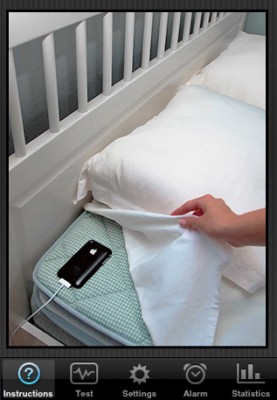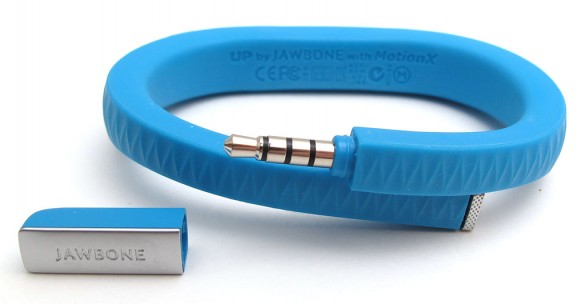
Sadly, the sleep tracking company Zeo Inc quietly closed its doors back in May and stopped manufacturing what was the most accurate sleep tracker on the commercial market. But there’s now plenty of new devices and apps trying to fill that void.
What you lose in accuracy, you gain in convenience. Today’s most popular sleep tracking devices don’t directly measure your brain activity. In fact, some of them don’t even touch your body at all.
What is sleep tracking?
Sleep tracking is what it sounds like – a systematic way to keep track of your sleep patterns. As the aficionados of the Quantified Self Movement like to say, “what is tracked, improves.”
By taking a look at your sleep data, you can easily see how your sleep is related to other factors such as diet, stress, and -–not pointing any fingers here -– those three glasses of wine after dinner.
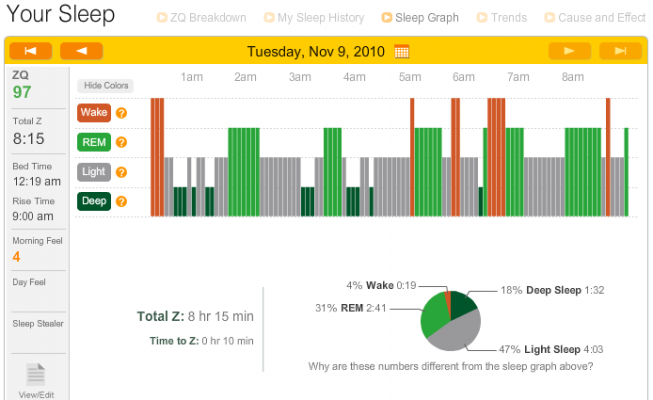
Getting nightly insights into your brain activity under the cover of darkness is addictive. A snapshot of a night of sleep using Zeo Sleep Coach, which, I repeat, is sadly dead.
It’s shocking actually how much our sleep is affected by everyday habits and lifestyle choices. Sleep is not a dead zone of activity but a very subtle period of brain recharging and cellular recuperation for the entire body. And because sleep is the third pillar of health (diet and exercise being the other two), when we sleep poorly, other aspects of health decline as well.
How Sleep Tracking Works
By and large, these devices and smart phone apps work by actigraphy, which is the detection and analysis of muscular movement while you sleep. The movements can determine the corresponding stage of sleep, because the different phases of sleep each have telltale markers. Actigraphy can also differentiate movements made while awake versus asleep.
It’s nowhere near sleep-lab quality data–this method is hardly used clinically alone– but it’s still pretty good for discovering secret periods of sleeplessness that you may not remember and for tracking your sleep totals over varying lengths of time.
So let’s review the best players!
This article is a round-up — I haven’t tested these devices myself, nor am I getting paid to review them. Also, I should mention that none of the sleep trackers on the market today have done any third-party validation to back their claims for accuracy in sleep staging, or for the physical and psychological benefits of using their products.
Sleep Tracking Hardware
 FitBit. There are two types of device here: Fitbit One is a clip-on, the Flex is a wristband. Both use actigraphy to log sleep, giving you information on total sleep time and awakenings by analyzing your movements throughout the night. This is key, as you learn about your sleep quality, not just hours laying down. A “smart alarm” also wakes you with non-intrusive vibrations when it determines you are in the lightest sleep stage close to your target wake up time. (I’ll discuss smart alarms more in a future article). Users rave about how the devices upload the data automatically via Bluetooth whenever you happen to pass close enough to your docking station.
FitBit. There are two types of device here: Fitbit One is a clip-on, the Flex is a wristband. Both use actigraphy to log sleep, giving you information on total sleep time and awakenings by analyzing your movements throughout the night. This is key, as you learn about your sleep quality, not just hours laying down. A “smart alarm” also wakes you with non-intrusive vibrations when it determines you are in the lightest sleep stage close to your target wake up time. (I’ll discuss smart alarms more in a future article). Users rave about how the devices upload the data automatically via Bluetooth whenever you happen to pass close enough to your docking station.
JawBone Up – It’s a sexy, flexible bracelet pedometer at first blush, with lots of features including sleep tracking via wrist-actigraphy. Up uses the data to gauge light sleep versus deep sleep (that is: Stage I and II is considered “light” and Stage III and REM is called “deep.” I have a problem with this grouping, but I’ll save it for another article.) Its smart alarm features 10, 20, 30 minute windows near your target wake up. Up doesn’t auto-synch (yet) – you upload to the iPhone manually to export and analyze your data.
![]() SleepTracker – Before the big boys joined this party, we had SleepTracker. Thanks to Time Magazine calling it the invention of the year in 2009 and to a spot on Dr. Phil, SleepTracker is selling very well, even though it costs over $150. One of the first wrist-actigraphy-based sleep trackers, Sleeptracker is designed like an old-school digital wristwatch. I am a fan of all things that remind me of the 1990s, so I had to include it. It also has advanced sleep tracking tools if you want to spend more.
SleepTracker – Before the big boys joined this party, we had SleepTracker. Thanks to Time Magazine calling it the invention of the year in 2009 and to a spot on Dr. Phil, SleepTracker is selling very well, even though it costs over $150. One of the first wrist-actigraphy-based sleep trackers, Sleeptracker is designed like an old-school digital wristwatch. I am a fan of all things that remind me of the 1990s, so I had to include it. It also has advanced sleep tracking tools if you want to spend more.
Lark – Lark is unique because it has more community and information support than any other sleep tracking device. Lark also was developed with the expertise of a Stanford University sleep researcher. The product features wrist-actigraphy and a smart alarm on a somewhat bulky-looking bracelet, combined by an iPhone app. It also has a subscription-based business model for those who really want to go deep into their sleep tracking, including a nice journal system and an exercise, diet and sleep coaching program.
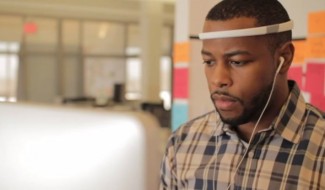 Melon. This device isn’t available yet, but I’m really excited about it because it may just fill the void of Zeo. Their team just finished a very successful Kickstarter campaign—raising almost $300,000—and is currently in development. Melon is a lightweight headband that tracks your brainwaves via EEG so you can track and optimize your conscious states. It’s the next generation of biofeedback: cheaper, practical and more elegant than ever. Applications include more efficient studying, exercising, meditation, and (supposedly) sleeping. And yes, that is drool.
Melon. This device isn’t available yet, but I’m really excited about it because it may just fill the void of Zeo. Their team just finished a very successful Kickstarter campaign—raising almost $300,000—and is currently in development. Melon is a lightweight headband that tracks your brainwaves via EEG so you can track and optimize your conscious states. It’s the next generation of biofeedback: cheaper, practical and more elegant than ever. Applications include more efficient studying, exercising, meditation, and (supposedly) sleeping. And yes, that is drool.
Zeo. I know, I know, Zeo is dead, and the MyZeo.com website is down, but, as of this publication, the Zeo API is still running, which means you can still extract your old data from the cloud and conceivably, continue taking in new data with your old Zeo device. Check out this article as well as Eric Blue’s data extraction tool for more updates on this.
Sleep Tracking Apps
Besides devices, there are a number of apps for smartphones that can track your sleep. These apps take advantage of the accelerometer in the device, so you just have to place the phone on your mattress when you lay down your weary head.
Caveats: sleeping with a partner will affect its readings, and so does memory foam. But people who sleep on memory foam with a partner probably don’t need to track their sleep because they have already won the game of life.
Sleep Cycle – this 99 cents iPhone app won theLifehacker award earlier this year as the most popular sleep tracking gadget. Mattress actigraphy plus some limited journaling. It also has a white noise feature for helping you relax before sleep.
Sleep Bot – iPhone and Google app. This is more of a sleep recording app – you punch in when you’re about to sleep, and it “punches you out” when the alarm goes off in the morning. So it doesn’t actually record awakenings or anything else, but is very user friendly.
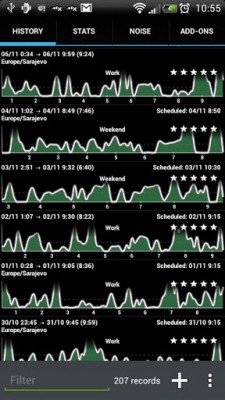 Sleep as Android – An app for Android phones. Free version gives you the basic sleep tracking and smart alarm features that are common to the devices I’ve described above.
Sleep as Android – An app for Android phones. Free version gives you the basic sleep tracking and smart alarm features that are common to the devices I’ve described above.
Like JawBone’s Up, it lumps deep sleep and REM sleep together, therefore waking you in “light” sleep only. The $2.99 version offers enhanced coaching and sleep tracking features. Also has other paid add-ons like lullabies and a stats manager.
There are more, but I think I covered the basic landscape. Do let me know if I forgot your favorite, or just to share your experience with sleep tracking devices below!
http://dreamstudies.org/2013/07/16/best-sleep-tracking-apps-devices/
